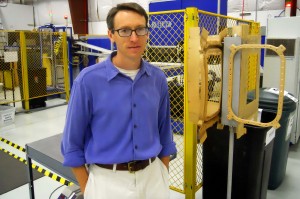At a time when many businesses are downsizing, FiberForge in Glenwood Springs is expanding. The company began with a plan to make super-efficient cars. Now it manufactures high-tech parts for everything from skateboards to military helicopters, and business is booming. David Frey reports.
(Listen to the story here.)
At the FiberForge factory in Glenwood Springs, the machines are humming. While the Roaring Fork Valley’s economy remains slow and unemployment is high, FiberForge is busier than ever, turning out parts that are both lightweight AND heavy-duty, for customers around the world. Exactly what they’re turning out, though, is both confusing, and sometimes, confidential.
“You’re looking at a large structural part that‘s carbon and glass fiber. It’s a channel. Glass fiber is on the inner and outer sides because it’s an insulator.”
“So what is this thing going to be?”
“I can’t tell you.”
“Seriously?”
“Seriously.”
Jon Fox-Rubin is president and CEO of FiberForge. He’s seen the company morph from its beginnings, when it set out to build the world’s first hydrogen car, to today, when it’s building parts for Marine helicopters. It’s most recent contract is to build six load floors for a new giant Sikorsky helicopter to carry supplies in military and humanitarian missions. If Congress approves it, FiberForge could get a contract to build hundreds more.
“ They will be building about 12 helicopters a year from 2014 for quite a while.”
FiberForge got its start 13 years ago when Fox-Rubin and David Cramer left Rocky Mountain Institute, a nonprofit environmental think tank in Old Snowmass, to spin off a for-profit venture they called Hypercar. The idea was to build the world’s first car run on hydrogen. But to do it, they’d need lightweight car parts, and they’d need to be able to make them fast and inexpensively. Soon, they found themselves in the business of making carbon fiber and glass fiber parts, components that are both lightweight and strong. Customers turned up from all sorts of industries. Now, FiberForge sells not just the parts. It sells its manufacturing system. Its technology goes into backpacks, kayak paddles, airplanes, skateboards, and now, military helicopters.
“It’s a perfect Colorado success story and one we hope we can replicate all over the state.”
Matt Cheroutes [shir-OH-tis] is spokesman for the Colorado Office of Economic Development and International Trade. It has named FiberForge one of fifty Colorado Companies to Watch – a list of midsize companies that seem to be on their way up. FiberForge was one of the few manufacturing companies on the list. But while manufacturing may be unusual in Colorado, especially in the Roaring Fork Valley, Cheroutes [Shir-OH-tis] says FiberForge may be a good example for others.
“Here’s the story of a company that sort of had a breakthrough technology- thermoplastic composite – and they were using it for one reason when they started. They’ve moved into different markets and are really starting to realize their potential.”
Mystery Ranch Packs in Bozeman, Montana, has been using carbon fiber for years in backpacks it sells to hikers and skiers, and to the military. It uses Fiberforge technology to make part of a backpack frame. Dana Gleason is the company’s principal and designer.
“These guys have basically built a machine that allows you to do some of the most exotic carbon fiber type work that is done in aircraft and spacecraft and made it so it is – admittedly barely affordable — but affordable to people who are making more prosaic, down to earth gear. Like a backpack.” [22 sec] [Machine noise]
The order for the helicopter parts pushed FiberForge to move into an old Coor’s beer warehouse and double its floor space to 25 thousand square feet. It’s had to grow its workforce, too, from 25 at the beginning of the year to 40, including engineers and machinists, and that number may grow more in the next year or two.
As for that super-efficient car? The automotive industry is starting to pick up where FiberForge left off. This year BMW became the first to build its own carbon fiber factory. Mercedes-Benz and Volkswagen are ramping up their use of carbon fiber. Last month, FiberForge sold equipment to a German research and development group to put in place technologies FiberForge has been working on for years.
For Aspen Public Radio, I’m David Frey.



